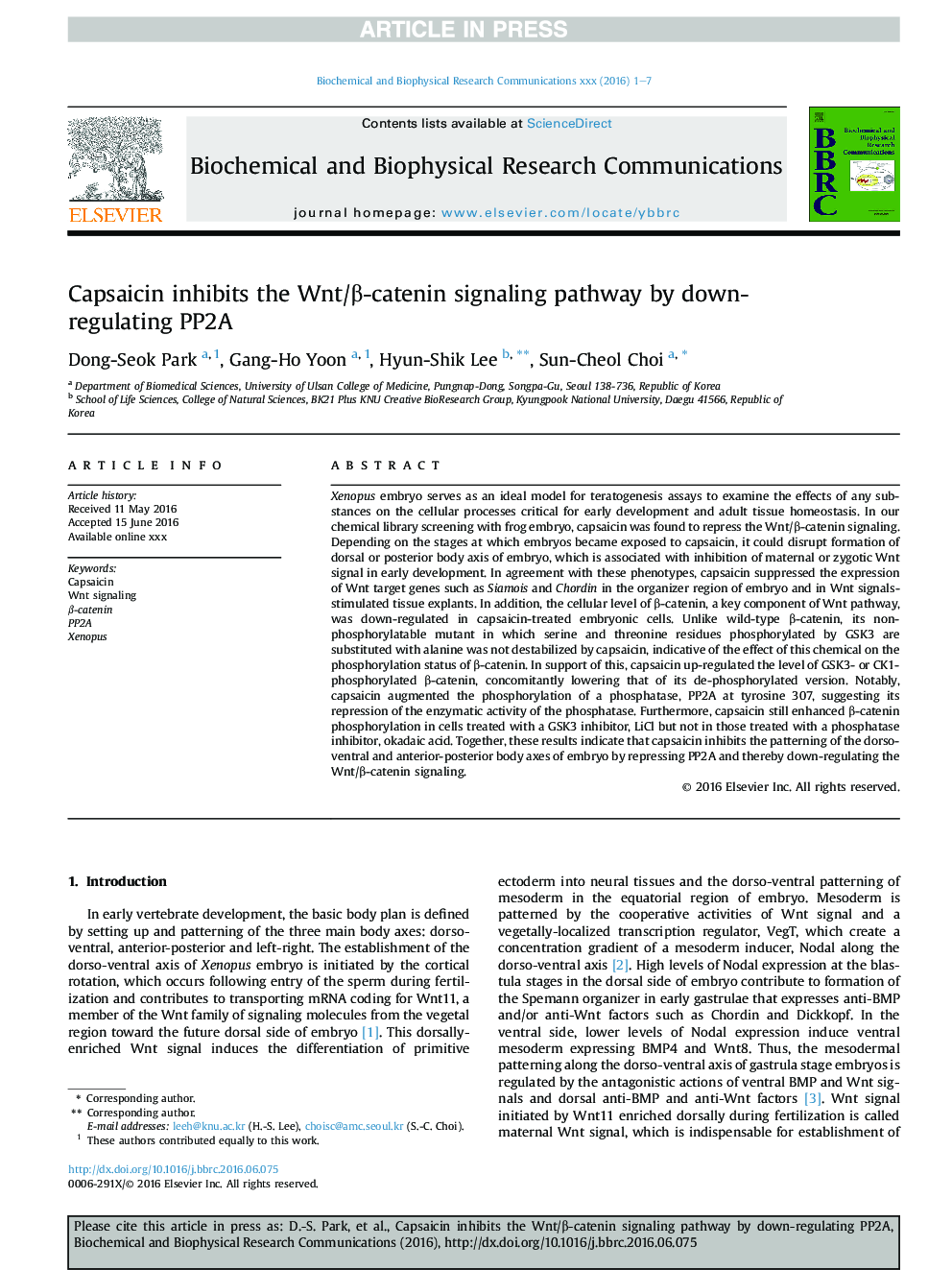| کد مقاله | کد نشریه | سال انتشار | مقاله انگلیسی | نسخه تمام متن |
|---|---|---|---|---|
| 10747907 | 1050253 | 2016 | 7 صفحه PDF | دانلود رایگان |
عنوان انگلیسی مقاله ISI
Capsaicin inhibits the Wnt/β-catenin signaling pathway by down-regulating PP2A
دانلود مقاله + سفارش ترجمه
دانلود مقاله ISI انگلیسی
رایگان برای ایرانیان
کلمات کلیدی
موضوعات مرتبط
علوم زیستی و بیوفناوری
بیوشیمی، ژنتیک و زیست شناسی مولکولی
زیست شیمی
پیش نمایش صفحه اول مقاله

چکیده انگلیسی
Xenopus embryo serves as an ideal model for teratogenesis assays to examine the effects of any substances on the cellular processes critical for early development and adult tissue homeostasis. In our chemical library screening with frog embryo, capsaicin was found to repress the Wnt/β-catenin signaling. Depending on the stages at which embryos became exposed to capsaicin, it could disrupt formation of dorsal or posterior body axis of embryo, which is associated with inhibition of maternal or zygotic Wnt signal in early development. In agreement with these phenotypes, capsaicin suppressed the expression of Wnt target genes such as Siamois and Chordin in the organizer region of embryo and in Wnt signals-stimulated tissue explants. In addition, the cellular level of β-catenin, a key component of Wnt pathway, was down-regulated in capsaicin-treated embryonic cells. Unlike wild-type β-catenin, its non-phosphorylatable mutant in which serine and threonine residues phosphorylated by GSK3 are substituted with alanine was not destabilized by capsaicin, indicative of the effect of this chemical on the phosphorylation status of β-catenin. In support of this, capsaicin up-regulated the level of GSK3- or CK1-phosphorylated β-catenin, concomitantly lowering that of its de-phosphorylated version. Notably, capsaicin augmented the phosphorylation of a phosphatase, PP2A at tyrosine 307, suggesting its repression of the enzymatic activity of the phosphatase. Furthermore, capsaicin still enhanced β-catenin phosphorylation in cells treated with a GSK3 inhibitor, LiCl but not in those treated with a phosphatase inhibitor, okadaic acid. Together, these results indicate that capsaicin inhibits the patterning of the dorso-ventral and anterior-posterior body axes of embryo by repressing PP2A and thereby down-regulating the Wnt/β-catenin signaling.
ناشر
Database: Elsevier - ScienceDirect (ساینس دایرکت)
Journal: Biochemical and Biophysical Research Communications - Volume 478, Issue 1, 9 September 2016, Pages 455-461
Journal: Biochemical and Biophysical Research Communications - Volume 478, Issue 1, 9 September 2016, Pages 455-461
نویسندگان
Dong-Seok Park, Gang-Ho Yoon, Hyun-Shik Lee, Sun-Cheol Choi,